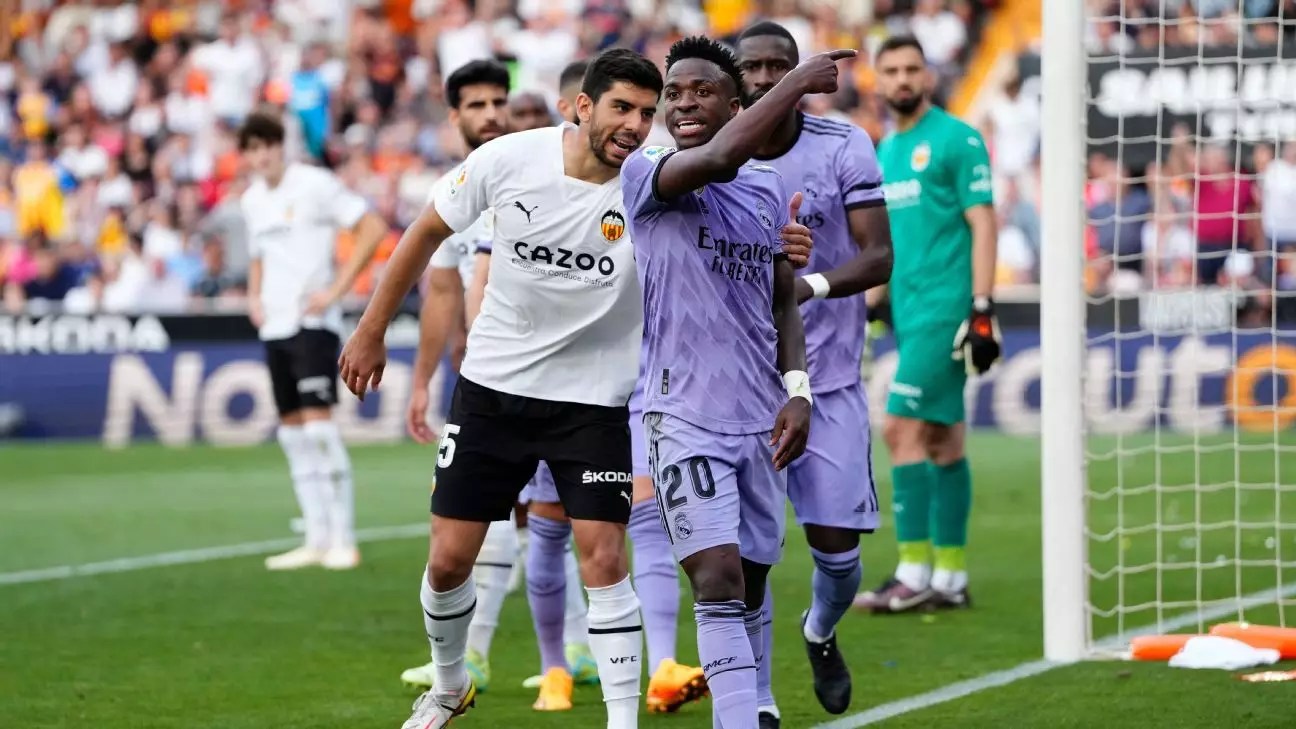In a significant step toward combating racism in football, LaLiga and the Spanish Football Federation (RFEF) have recently adopted FIFA’s new “No Racism” gesture—a cross-arm symbol that will allow referees to denote reported incidents of racial abuse on the field. This initiative stems from a directive approved during FIFA’s congress in May 2024, highlighting the urgent need for visible, decisive action against racism within the sport. The significance of this gesture is not merely as a formality; it represents a broader commitment to acknowledge and address the rampant racism that has been a persistent issue in Spanish football.
Racism in Spanish football has garnered increased scrutiny, especially following alarming incidents involving prominent players like Vinícius Júnior of Real Madrid. His experiences have become emblematic of a larger systemic problem, with fans frequently subjecting him to racial slurs during matches. The heavily publicized case earlier this year, which saw three fans receive prison sentences for racially abusing him at Valencia’s Mestalla Stadium, marked a rare judicial response but also highlighted ongoing failures in addressing these grievances. Such events underscore a worrying culture where racial abuse, unfortunately, can be perceived as a normalized aspect of the game.
As reported, racist incidents are not isolated events; they are symptomatic of a deeply rooted issue that demands not only acknowledgment but also robust action. The case of Vinícius, who has actively spoken out against the hostile environment he faces, reflects a growing discontent among players advocating for the respect and dignity they deserve on the field.
The Implementation of Procedures
The FIFA-endorsed cross-arm gesture is more than a symbolic act; it forms part of a three-step protocol aimed at curbing racial abuse. If an official recognizes or is alerted to an incident, the match will be paused, and a public announcement will be made to warn the crowds of potential suspension. The second step leads to a temporary suspension, effectively sending players to the dressing rooms, while the third step may result in a complete abandonment of the match after consultation with necessary authorities. This structured response provides officials with clear guidelines, creating a more accountable environment for handling such offenses.
A significant element of this initiative is the involvement of security and club officials before taking drastic measures, signifying a collective responsibility among all stakeholders in the sport. Although this represents progress, the effectiveness of these measures will largely depend on their prompt and consistent application in real scenarios.
Furthermore, Vinícius has expressed his unwillingness to tolerate ongoing abuse, openly stating that Real Madrid would consider walking off the pitch in protest. In doing so, he is placing immense pressure on LaLiga and its decision-makers to take more concrete steps against racism. Despite denial from LaLiga’s president Javier Tebas about the league fostering a tolerable culture for racism, the player’s statements reveal a growing narrative of discontent among many players and their representatives.
While Tebas has called for new powers to penalize offenders directly, Vinícius’s assertion that “racism is normal in LaLiga” highlights a perception gap between governing bodies and the players who experience systemic discrimination. This disconnect is further exacerbated by Vinícius’s warning that if conditions do not improve by 2030, there may be significant ramifications, including the potential relocation of the World Cup.
Looking Ahead: The Need for Comprehensive Change
The introduction of the “No Racism” gesture is undoubtedly a pivotal step forward, yet it serves as a reminder that gestures must be coupled with genuine corrective measures and cultural shifts. Words of solidarity are insufficient without tangible action—whether it be through stricter penalties, educational initiatives targeting fans, or collaboration with anti-racism organizations.
As the world of sport navigates this complex terrain, Spanish football is at a crossroads. The response to racism must evolve beyond mere reactions to incidents, fostering an environment where every player can feel safe and respected. With collective efforts, both from governing bodies and players alike, Spanish football can aspire to be a model in the global fight against racism. The path to establishing a truly inclusive football culture is long, but the adoption of the “No Racism” gesture marks a significant milestone on this journey.


Leave a Reply